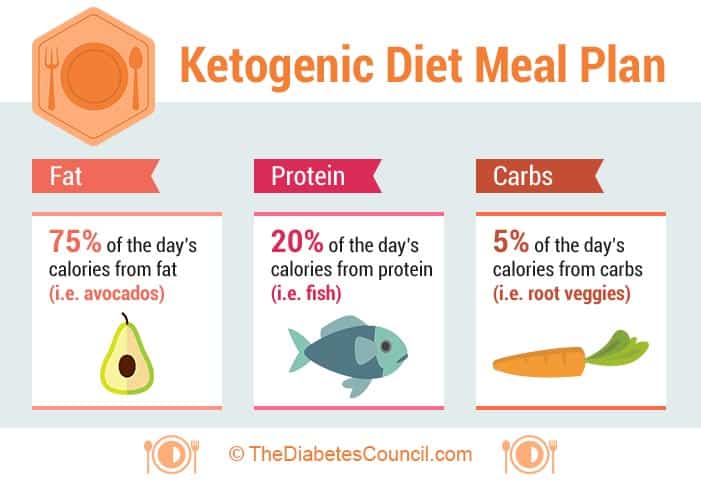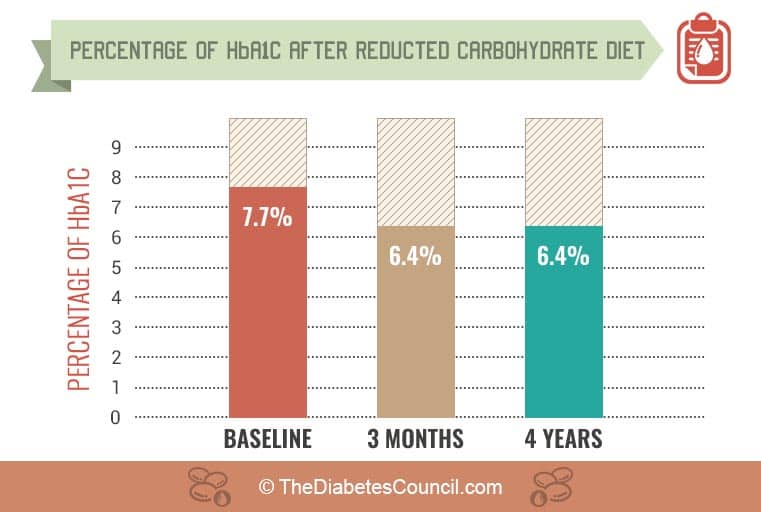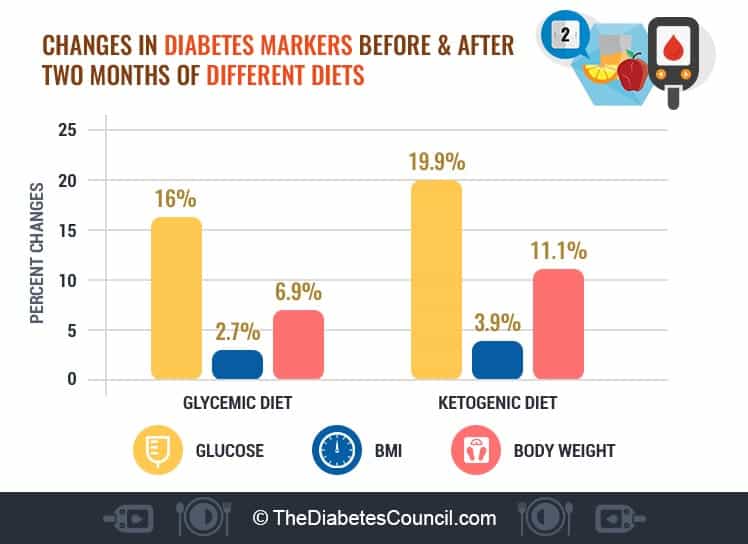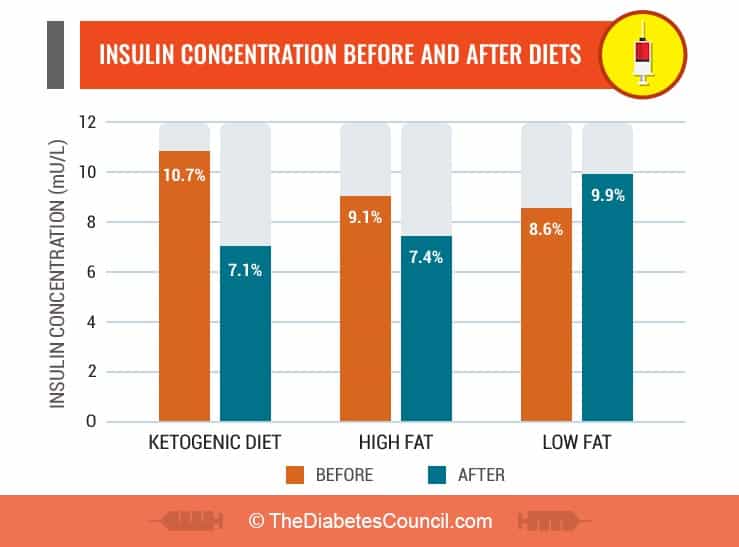In this article we will cover what a Ketogenic diet is and if you can manage your diabetes while on this diet.
Ketogenic diet for diabetics is a highly controversial topic, but we will break down everything here for you! As a Certified Diabetes Educator (CDE), I have to tell you from the start I will have a biased view here. Sorry, but I feel that I need to be completely honest right up front! I will however, present all the evidence that is available currently on the subject.
As a CDE, I have been taught to follow the American Diabetes Association Dietary Guidelines for Americans which is low in carbohydrates, high in fiber, with fresh vegetables, fruits and whole grains.
The Ketogenic Diet this article will be discussing is much lower in carbohydrates, in order to promote the state of nutritional ketosis, or the fat burning state for weight loss.
What is a Ketogenic Diet?

The Ketogenic Diet is a low carbohydrate diet, consisting initially of less than 20 carbohydrates per day. Not per meal, yes, you heard me correctly, per day. It is not for the faint of heart and yes I am writing from experience. Of course I have tried it! Hasn’t everybody in America at some point who has wanted to lose weight? Does it work you ask? Of course it does! The problem is how long can you keep it up?
Your body uses the carbohydrates you eat for energy, so if we restrict how many carbohydrates we eat, the body has to get its fuel source from fat. A byproduct of this fat burning state are ketones which are produced; this is called nutritional ketosis. You can determine if you are in this fat burning state by purchasing urine ketone testing strips from your local pharmacy.
The Ketogenic Diet with Diabetes
Some precautions must be made clear;
- this diet is not appropriate for people with any stage of kidney disease.
- this diet is not for people who are pregnant, nursing or who have Gestational Diabetes.
There are also other considerations such as the possibility that you may need to rapidly change your medications while on this diet. If you are considering the Ketogenic Diet, I urge you to first speak with your physician or endocrinologist to develop a plan.
Since you will be drastically reducing the amount of carbohydrates you are consuming, that may require a medication adjustment. Then, once you begin to lose weight, you may require medication adjustments.
What to eat and what not to eat in a ketogenic diet
For starters, forget about eating anything white essentially on the Ketogenic Diet. No more potatoes, bread, rice, pasta, cake, pies or sweets.
You can eat any meat (without coating on it like fried chicken), fish or poultry, soft, full fat cheese, eggs, salad and no starch vegetables, olives, half of an avocado, butter, oils, and certain sugar free foods and drinks.
When Steve contacted TheDiabetesCouncil, he wanted to know where to find information on meal plans for the Ketogenic Diet. There are many resources online where you can search for meal plans for the Ketogenic Diet. There are also many books you can purchase at your local bookstore. The Atkins Diet is the most well- known Ketogenic Diet in its Induction Phase which is the first 2 weeks in this diet.
I must tell you when looking at this link they say the American Diabetes Association Guidelines call for 60-75 carbohydrates per meal and that is simply not true. The ADA has recommended since 2013 we use our best clinical judgement in recommending a low carbohydrate diet for people with diabetes, recognizing it needs to be individualized. 60-75 grams is the carbohydrate amount I would give to a very tall, large boned man or perhaps an active teen or young adult. I would never recommend that many carbohydrates for an average size man who was trying to lose weight; he would get 45-60 grams of carbohydrates per meal and 15-30 grams for snacks. A women trying to lose weight would get 30-45 grams of carbohydrates per meal and 15 grams for snacks.
Can a Ketogenic Meal Plan Be Used to Prevent Diabetes?
Obviously, if you could keep the weight off, it may help in preventing diabetes. There are many risk factors for diabetes, but the Diabetes Prevention Program in 2002 followed 1,079 people with prediabetes. This groundbreaking study showed that 58% were able to prevent the progression of developing diabetes through diet and exercise. Want to know what the great news is? They didn’t have to eat 20 carbohydrates per day to achieve this!
For more diabetes dietary advice read the following:
Can a ketogenic diet reverse diabetes?
I can’t tell you how often through the years I have been asked the question, “If I lose 20 pounds, will I no longer have diabetes?” Let me answer this very clearly, there is currently no cure for diabetes. Once you have been diagnosed, you have it for life. Every day, our most brilliant researchers are busy searching for a cure though. There is good news however; you can manage your diabetes, get it under control, prevent all the complications of diabetes and live a normal, healthy life.
Is the Ketogenic Diet Safe For Women With Gestational Diabetes?
If you are pregnant or are nursing, you should not follow a Ketogenic diet. You will not receive enough of the recommended carbohydrates, vitamins and nutrients necessary for yourself and your growing baby on this diet. Your obstetrician will recommend how many carbohydrates you should consume per meal and for snacks during each phase of your pregnancy. They will likely refer you to a Certified Diabetes Educator for nutritional counseling as well. Please check out The Diabetes Council’s FAQ' About Gestational Diabetes for all your gestational diabetes related questions.
Whether you have gestational diabetes, or pre-existing Type 1 or Type 2 Diabetes and have now become pregnant, all the same rules still apply when it comes to dietary guidelines. Carbohydrate intake will be moderated, and you will need to consult your obstetrician to determine your individual recommendations.
When you are pregnant and/or nursing, you need a well-rounded diet with foods from all of the food groups; fruits, vegetables, proteins, breads, grains, and especially milk and other forms dairy for your daily intake of vitamins C and D. Vitamins C and D are essential to proper bone growth for your developing baby.
As a Certified Diabetes Educator, I was taught to educate my gestational diabetes and pregnant patients with diabetes to avoid fruits and dairy before noon. I know this is hard! That’s when you all are craving that glass of orange juice, but that’s the whole point here. We need you to give up that orange juice for the next six or so months for the sake of your baby. Instead, you can have a real orange with lunch; try it with a spinach salad with tuna salad and whole wheat pita. The nutritional value is pumped up by all those vitamins and the spike on your blood glucose will be reduced dramatically by the fiber in the real fruit combined with the protein you had in your lunch. You can even have a glass of milk; you’ve included all of your necessary food groups, and you are still only at 45 carbohydrates for the whole meal!
Can A Ketogenic Diet Cause Diabetes?
The good news here is no! All the evidence points to the fact that a low carbohydrate diet actually does lower blood glucose and A1c levels and does contribute to weight loss. The problem is we do not yet have enough large studies, over enough sustained years to support evidence that people with diabetes can remain on a highly restrictive Ketogenic Diet for the rest of their life and also not have other consequences to their health.
Firstly, I am highly skeptical that anyone can sustain such a restrictive diet long term without it having a negative impact somewhere else in their life. At some point, they will start stressing about what or what they are not eating. That stress is going to lead to many other harmful consequences to their bodies.
Secondly, I for one could not be happy knowing that I had to limit my diet so drastically from for the rest of my life. Let’s face it, our lives our built around our meals. My husband is texting me before noon each day asking what our dinner plans are each day.
One study from 2003 followed 132 participants; half on a low carbohydrate diet restricting them to less than 30 carbohydrates per day, the other half on a low fat diet. These participants were then followed up with after one year. It was found that 34% had dropped out, not being able to sustain such restrictive diets even for one year.
Now, I know what you are going to say, “I can take a break from the diet anytime.” What do you think happens when you take that “break”? As soon as you start consuming a normal amount of carbohydrates again, you immediately go out of ketosis or the fat burning state, and your body starts storing fat again immediately. In other words, you immediately start gaining weight. So whatever weight you lost on the diet, you gain back right away. How healthy do you think it is for your body to be in a starvation mode, then in a feeding frenzy, making up for lost time?
Thirdly, you cannot get all the nutrition you need from this diet. You need foods from all of the food groups for a healthy body. Now, I can already hear some of you arguing with me…the cavemen didn’t have access to fresh fruit. Nope, they sure didn’t and look how long they lived. What was their average lifespan?
Herein lies the problem. I believe the solution is moderation. Moderation in the number of carbohydrates you consume every day and in when you consume them.
Is it good or bad for people with Diabetes?
The short answer here is it definitely depends on the type of diabetes that you have, but the ketogenic diet does seem to have health benefits and consequences for all types of diabetes.
As I stated earlier, and forgive me if I am blunt, forget it if you are pregnant. Momma, you need your nutrition!
For people with Type 1 Diabetes, you probably have heard of their diabetic emergency, diabetic ketoacidosis, also referred to as DKA. This can be life threatening condition for people with Type 1 diabetes and Certified Diabetes Educators spend many hours teaching preventive care for DKA. This condition should not be confused with nutritional ketosis, the fat burning state reached when following the Ketogenic diet. The two conditions are quite different.
So, is the Ketogenic Diet safe for people with Type 1 Diabetes?
One study from 2005 followed 22 people with Type 1 Diabetes for 12 months. The difference here however is they consumed 70-90 grams of carbohydrates per day versus the restrictive less than 20 grams per day on the Ketogenic Diet. Remember my motto? Moderation is the key! The results were positive; less hypoglycemia, insulin requirements were reduced and their A1c dropped from 7.5% to 6.4%.
Does the Ketogenic Diet Benefit People With Diabetes?
The jury is still out on this important question! In my humble opinion, the limited research we have so far simply does not support that it does.
There have not been very many studies done and of these studies, the data is very limited or they have serious flaws.
Either there are very few participants in the studies, they don’t have an even number of males vs. females, or they don’t last but a few months. One study only looked at 28 people; only 21 completed the study and 20 of these participants were men. On top of this, they were only followed for 16 weeks. Okay, so we see that 20 men can limit their carbohydrates severely for 4 months and lose weight which automatically makes their A1c come down. Great! So, the real question is, how long can these 20 men stay on this diet for the rest of their lives? How long would you like to go without eating any fresh fruit? I’m craving some now, so I’m taking a break to go grab a snack now!
Ok, I feel better! Let’s finish this up!
In a study that was sponsored in part by the Atkins Foundation in 2004; 105 participants with Type 2 diabetes were followed for one year. Half followed a low carb diet (Atkins), the other half a low fat diet.
Ok, let’s break this down. So with this study you have a decent number of participants…I would love to see 1000, but 105 is certainly better than 20. Many ages, races and socioeconomic backgrounds were represented. There were a closer number of males versus females included in the study. Lastly, they were followed for a longer period of time, a full year.
The suspense is killing you isn’t it? No real differences in either A1c or weight loss in the two groups; in other words, they lost about the same amount of weight (3.4%) and no change in their A1c levels.
19% of the people had dropped out by the one year mark however, which again, supports my theory that over the lifespan, severely limiting your diet is unsustainable. And come on people, why would you even want to risk your health or mental well-being on something that science hasn’t even proven as beneficial?
Case in point, Steve Richert has Type 1 Diabetes and his September 1, 2015 blog The Ketogenic Diet and Type 1 Diabetes: What I Eat. He gave it the good old college try and has fearlessly came back and showed us all his results. His cholesterol increased, which just like mine, was due genetic factors, but was exacerbated by the Ketogenic Diet. So, what’s the best part of Steve’s story? He’s coming close to being right in line with what I would recommend for him! Moderation and the mediterranean diet; he’s currently trying a modified ketogenic diet or really a modified mediterranean diet. Brilliant and exactly what we all should be doing!
Some interesting stats
Insulin concentration before and after diets:
I’ve been there and have tried the Ketogenic Diet. It’s very difficult even though I am a very determined and goal oriented person. When I set my mind up to do something, I will normally achieve it because I am just so stubborn about personal goals that I don’t give up until I do! Yes, you will lose a lot of weight quickly, but I am not interested in giving up bread, pasta and birthday cake for the rest of my life.
The fact is, the stress that you will bring on yourself from constantly restricting every single thing you put in your mouth is far more detrimental to your health. Remember, moderation is the key! You can count your carbohydrates and follow a sensible low carbohydrate diet to control your blood glucose and your weight. Exercise will always be the key component to add that contributes to added weight loss.
My pick for the healthiest meal plan for diabetes? My favorite is the Mediterranean Diet. It’s high in fiber, low in saturated fats and includes no processed foods which is the challenge for all of us at this point in history. If we could all eat like they do in Italy and Greece! Think of Sicily and the coasts of Greece where their diet consists of fresh fish, fresh fruits and vegetables, nuts, beans, seeds, olives and olive oil, lean meats such as chicken and pork, some eggs and little red meat. The American Heart Association recommends it as well as the American Diabetes Association as being one healthy diet choice for people with diabetes.
Further reading:
My best advice, always consult your physician first regarding what type of diet you should be on! Then, team up with a Registered Dietician and/or a Certified Diabetes Educator to develop a meal plan with an individualized carbohydrate count for you.
Make sure to read what experts think about diabetes type 2 and ketogenic diet.
TheDiabetesCouncil Article | Reviewed by Dr. Sergii Vasyliuk MD on June 01, 2020
References
- http://www.diabetes.org/newsroom/press-releases/2016/2015-202-dietary-guidelines-to-promote-healthier-living.html
- http://care.diabetesjournals.org/content/36/11/3821.full
- https://www.ncbi.nlm.nih.gov/pmc/articles/PMC1282458/
- https://www.ncbi.nlm.nih.gov/pubmed/15148064
- http://eatingacademy.com/nutrition/is-ketosis-dangerous
- https://www.ncbi.nlm.nih.gov/pubmed/16454166?access_num=16454166&link_type=MED&dopt=Abstract
- https://www.ncbi.nlm.nih.gov/pmc/articles/PMC1325029/
- http://care.diabetesjournals.org/content/32/7/1147
- http://www.heart.org/HEARTORG/HealthyLiving/HealthyEating/Mediterranean-Diet_UCM_306004_Article.jsp#









